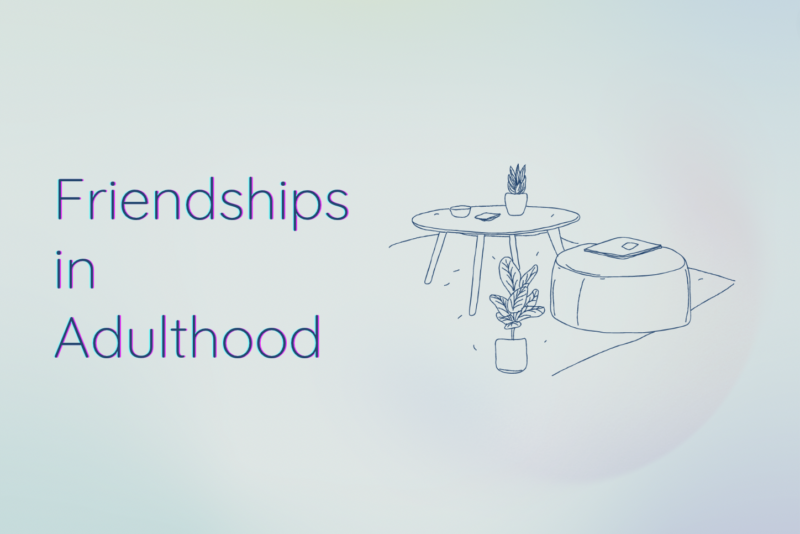Friendships in Adulthood
By Roamers Therapy | April 2023
There are some transitions we expect to experience in adulthood, but many changes during this period come as a surprise. No one prepares us for the shifts in our friendships, or the difficulty of navigating friendships in adulthood. From childhood to young adulthood, initiating and maintaining friendships may have seemed an easier task. Adults at daycare, schools, and in our families may have engaged in conversations about friends and facilitated the process of making friends. Additionally, the amount of time spent in daycare or other educational settings allows us to easily maintain friendships since we see those people almost daily. Over time, others’ involvement in our friendships decreases and so does the frequency of interacting with friends. We may notice a shift in our friendships between high school and college or in entering the workforce. These shifts may feel more intense as we continue growing throughout our lives, learning how to balance work, family, self care, and more.
How do you make new friends in adulthood?
- Reflect on what you value in a friendship. You may not be able to filter out where to meet people based on these values but they will provide you with a foundation when you start meeting people.
- Make an effort to deepen relationships with people you already know. Are there people in social spaces you are currently a part of that you might connect with? These people can be neighbors, coworkers, members of the same organization or people from extracurricular activities. Try going beyond situation-based conversation and explore common interests and/or share things about yourself.
- Join groups or go to spaces where you can meet people based on mutual interests. If you enjoy reading books, you might join a book club. If you enjoy sports, you may go to a sports bar.
- Try friendship apps. Just like dating apps can help you narrow down potential prospects, friendship apps can too. Apps can be a convenient way of meeting people from home and getting a sense of what another person is like before deciding to meet up.
- Overall, remember to have patience, make an effort to initiate, and step out of your comfort zone.
How do you maintain friendships in adulthood?
- Make time for connection. Reflect on your responsibilities and schedule and set aside some time each week or month to have in-person interactions with friends. With long-distance friendships, make an effort to interact via text/phone call and plan at least one to two in-person interactions.
- Communicate. Frequency and amount of communication does not dictate the genuineness of a friendship. It is no secret that adulthood comes with many responsibilities and there may be times where you can’t find the time or energy to connect with friends. This is okay! Let your friends know you may not be as available so they are aware you are not distancing yourself, simply busy during that period.
- Be open and honest. Trust is maintained through vulnerability. Don’t be afraid to let close friends inside your world!
At Roamers Therapy, our psychotherapists are here to support you through anxiety, depression, trauma and relationship issues, race-ethnicity issues, LGBTQIA+ issues, ADHD, Autism, or any challenges you encounter. Our psychotherapists are trained in Cognitive Behavioral Therapy, Dialectical Behavioral Therapy, Psychodynamic Therapy, Acceptance, and Commitment Therapy, Person-Centered Therapy, and Gottman Therapy.
Whether you’re seeking guidance on a specific issue or need help navigating difficult emotions, we’re ready to assist you every step of the way.
Contact us today to learn more about our services and schedule a session with our mental health professionals to begin your healing journey. To get started with therapy, visit our booking page.
First, decide if you’ll be paying out-of-pocket or using insurance. If you’re a self-pay client, you can book directly through the “Book Now” page or fill out the “Self-Pay/Out-of-network Inquiry Form.” If you’re using insurance, fill out the “Insurance Verification Form” to receive details about your costs and availability. Please let us know your preferred therapist. If your preferred therapist isn’t available, you can join the waitlist by emailing us. Once your appointment is confirmed, you’ll receive intake documents to complete before your first session.
This page is also part of the Roamers Therapy Glossary; a collection of mental-health related definitions that are written by our therapists.
While our offices are currently located at the South Loop neighborhood of Downtown Chicago, Illinois, we also welcome and serve clients for online therapy from anywhere in Illinois and Washington, D.C. Clients from the Chicagoland area may choose in-office or online therapy and usually commute from surrounding areas such as River North, West Loop, Gold Coast, Old Town, Lincoln Park, Lake View, Rogers Park, Logan Square, Pilsen, Bridgeport, Little Village, Bronzeville, South Shore, Hyde Park, Back of the Yards, Wicker Park, Bucktown and many more. You can visit our contact page to access detailed information on our office location.

